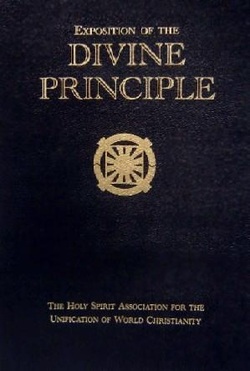DIVINE PRINCIPLE

Source: Excerpts from the www.newworldencyclopedia.org
The Divine Principle or Exposition of the Divine Principle (in Korean, Wolli Kangron, hangul: 원리강론, hanja: 原理講論) is the main theological textbook of the Unification Church. The text presents itself as a new revelation from God, given through the Reverend Sun Myung Moon. The term "Divine Principle" is also used by Unificationists to refer to a metaphysical concept of divine truth, of which the text is only an imperfect human expression.
The Divine Principle follows the format of systematic theology, basing its insights on exegesis of the Bible. However, it is held by some believers to have the status of scripture itself. The content starts with God's purpose in creating human beings, the Fall of man, and redemption—the process through history by which God is working to remove the ill effects of the human fall and restore humanity back to the relationship and position that God originally intended.
According to its preface, The Divine Principle expresses universal truth; it inherits and builds upon the core truths which God revealed through the Jewish and Christian scriptures and encompasses the wisdom from the Orient. Aside from its first chapter, the Principle of Creation, which is replete with Eastern concepts such as Yin and Yang, the greater part of the book relies almost entirely on the Bible. Yet a close reading shows that the text approaches the Bible from an Eastern sensibility, informed by such Confucian concepts as filial piety and the centrality of the family.
The words "Divine Principle" are a direct translation of the Korean term wolli, which literally means "original principle"—'original' in the sense of God's original plan for creation. While some Unificationists speak of the "Divine Principles," plural forms are not normally used in Korean, and there is a sense that these principles fit together into a unitary whole.
Unification Church members sometimes refer to the Divine Principle (or simply "The Principle") meaning not only the specific translation of Wolli Kangron, but an eternal truth already existing in the universe before the books were written. Indeed, many believe the Divine Principle's overt attitude toward the Bible also applies to itself, namely: "[It] is not the truth itself, but rather is a textbook teaching the truth."
The Divine Principle or Exposition of the Divine Principle (in Korean, Wolli Kangron, hangul: 원리강론, hanja: 原理講論) is the main theological textbook of the Unification Church. The text presents itself as a new revelation from God, given through the Reverend Sun Myung Moon. The term "Divine Principle" is also used by Unificationists to refer to a metaphysical concept of divine truth, of which the text is only an imperfect human expression.
The Divine Principle follows the format of systematic theology, basing its insights on exegesis of the Bible. However, it is held by some believers to have the status of scripture itself. The content starts with God's purpose in creating human beings, the Fall of man, and redemption—the process through history by which God is working to remove the ill effects of the human fall and restore humanity back to the relationship and position that God originally intended.
According to its preface, The Divine Principle expresses universal truth; it inherits and builds upon the core truths which God revealed through the Jewish and Christian scriptures and encompasses the wisdom from the Orient. Aside from its first chapter, the Principle of Creation, which is replete with Eastern concepts such as Yin and Yang, the greater part of the book relies almost entirely on the Bible. Yet a close reading shows that the text approaches the Bible from an Eastern sensibility, informed by such Confucian concepts as filial piety and the centrality of the family.
The words "Divine Principle" are a direct translation of the Korean term wolli, which literally means "original principle"—'original' in the sense of God's original plan for creation. While some Unificationists speak of the "Divine Principles," plural forms are not normally used in Korean, and there is a sense that these principles fit together into a unitary whole.
Unification Church members sometimes refer to the Divine Principle (or simply "The Principle") meaning not only the specific translation of Wolli Kangron, but an eternal truth already existing in the universe before the books were written. Indeed, many believe the Divine Principle's overt attitude toward the Bible also applies to itself, namely: "[It] is not the truth itself, but rather is a textbook teaching the truth."